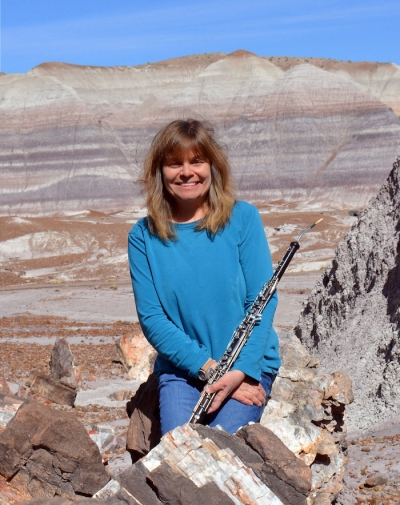
Jill Haley at The Petrified Forest.
Jill Haley is a fascinating composer/musician who is getting ready to release her third album for 2021 in November. Jill is probably best-known as an oboist/English horn player, but she is also a very accomplished and expressive pianist. In addition to her own recordings, Jill has played on dozens of albums produced by Will Ackerman at his Imaginary Road Studio in Vermont - a big part of why Imaginary Road recordings have a very distinctive sound. Jill has a very interesting story to tell, as you will see in this interview conducted via email in September 2021.
KP: Hi Jill! Thanks for doing this interview! You have composed and recorded a lot of music about nature and specific areas of the US. Are you traveling these days or working mostly from home?
JH: Around the time I received my vaccine in April, restrictions on travel began to ease up, so I was able to complete three Artist in Residencies that had been postponed due to the pandemic. From 3/20 to 4/21 however, most of my work was done from home.
KP: You have released two albums so far this year with a third one on the way. Has this long period of the pandemic been especially productive for you?
JH: The recording on
The Canyons and Mesas of Bandelier was done in 2020, however the music was written in 2019 when I did a residency at Bandelier in New Mexico. The 2nd project,
The Silence of Grace, was recorded in 2019 with Deborah Martin of Spotted Peccary Records. She completed the technical end of her work during the pandemic. The 3rd recording,
Wrapped in Light, is absolutely a product on the enforced time at home and was a way for me to cope with this difficult time. I doubt this recording would have been made if we had not gone through these tumultuous times.
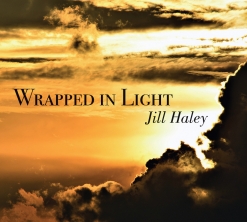
Click on album covers
to go to Kathy's reviews.
KP: The Canyons and Mesas of Bandelier (2021) is the seventh in your series of albums inspired by US National Parks, Monuments, and Sites. When I was reviewing it, it seemed that that album had more piano (played by you) than your other albums. Is that correct?
JH: Perhaps a bit more piano. These pieces were mostly written on a keyboard while I was living at Bandelier. I felt they were complete for the most part and needed little re-arranging.
KP: I agree! What time of year did you do your Artist In Residency in Bandelier (New Mexico)?
JH: October 2019.
KP: We'll come back to the National Park series in a minute. The second album you released in 2021 was The Silence of Grace with Deborah Martin. That album was inspired by the Pacific Northwest. How did that album come about?
JH: Deborah and I met at a Zone Music Reporter event in New Orleans a few years ago. My husband, David Cullen, and I were invited to perform a short set of National Park music on guitar and oboe. Deborah heard our performance and approached me about possibly working together on a recording. Of course I was familiar with Spotted Peccary, but never envisioned this as a possible label to work with since their music is much more ambient than mine. I welcomed the idea, however, of combining my acoustic sounds with Deborah’s electronic and percussive sounds.
KP: It's a great combination, and I loved reviewing that album, too! What are some of the areas in the PNW you visited as you and Deborah were composing the music?
JH: Deborah invited me to spend two weeks at her home in Vancouver, WA, so she could introduce me to many of the lovely areas in the PNW while we created music together. We visited places like The Grotto and Mount Tabor in Portland, and then traveled further to Mount Adams, Gifford Pinchot National Forest, Mount Hood and the Columbia River Gorge.
KP: Do you plan to do more recordings with Deborah?
JH: Yes! I spent a week with her in August 2021 recording eight new tracks for our 2nd project with a release date hopefully next year. She has a 3rd project in mind to follow this 2nd recording, too.
KP: I'll be looking forward to those!
The third album for 2021 will be released on November 1 and is called
Wrapped in Light. Tell us about that.
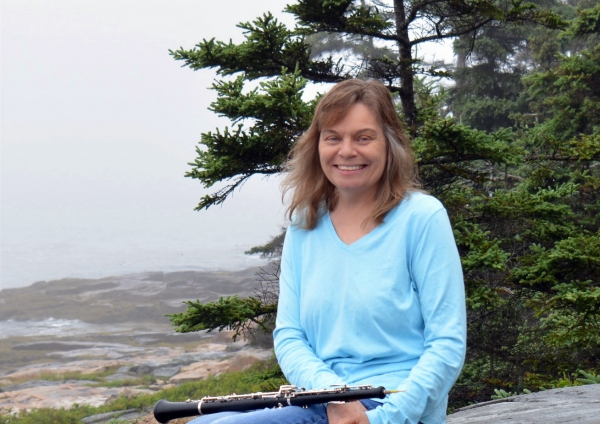
Jill at Acadia National Park in Maine.
JH: Like so many of us, I felt angry, frightened, unsure of anything, bored and frustrated when our world as we knew it came to a halt in March 2020. So many parts of my life that bring joy were halted such as travel and playing in orchestra and chamber ensembles. Once I was able to wrap my head around the fact that feeling sorry for myself wasn’t going to help me get through this, I decided to read the Book of Psalms and create musical ideas based on the lovely imagery in these writings. I decided to add electronic synthesizers to many of the piano tracks to create a feeling of smoothness. Calmness and simplicity seemed to be an essential part of this project - probably born out of my feeling so out of control.
KP: I'm listening to it right now, and it's stunning! I love the peaceful energy that comes across so well! That one will be released on your Cor Anglais label, right?
JH: Yes
KP: Is that album solo or do you have guest artists on it, too?
JH: My initial intent was to record this as a solo project as an extension of feeling “alone” during this time. As I progressed through the recording however, it became apparent that adding David’s guitar and bass and Graham’s (our son) cello sounds would only enhance the overall production. I realized at this point, too, that in a symbolic sense, the three of us were all along on the same journey!
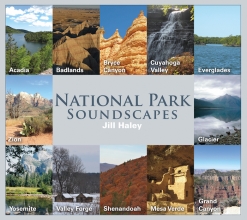
Click on album covers
to go to Kathy's reviews.
KP: I'm sure many of your listeners will be able to relate to that, too!
You are one of the frequent guest artists on many of the albums recorded at Will Ackerman's Imaginary Road studio. How did that gig come about?
JH: I have known Will Ackerman for over 30 years. Back in the 1980’s, David frequently traveled with Will as a supporting musician and guitar tech on his concerts throughout the country. In the late 1980’s, Will asked David for a woodwind player recommendation - luckily he thought of me! I joined Will on concert touring for about 15 years and when he built his studio in VT, he asked me to come up and play oboe and English horn for his clients' projects. We continue to work together. I just returned to his studio last week for the 1st time since the pandemic and it was wonderful to work with Will and Tom [Eaton] again!
KP: They are an amazing team! Your oboe and English horn definitely help to give the recordings that are done at Imaginary Road a distinctive sound. Do you usually go to Vermont to record your parts or are you able to do them from home?
JH: Usually I go to VT, but on occasion I have met Will at a studio in NYC or have sent tracks done remotely from a studio near my home. We both prefer to work live together though - he can really help me shape ideas that he knows will enhance the project.
KP: Let's go back to your National Park series. How did you come up with the idea for the series?
JH: After a visit to Glacier National Park in 2010, I came home and found myself writing an album’s worth of music about this beautiful place. I recorded and released Glacier Soundscapes in 2010, and enjoyed the process so much, I decided to visit more Parks and create music. This morphed into video work, too, that often accompanies my music in concerts and online.
KP: Which parks have you recorded albums about?
JH: Glacier, Zion and Bryce Canyon, Badlands, Bandelier and a compilation of 12 tunes about different National Parks that was released in 2016 for the National Park Service.
KP: Did you do residencies in all of them?
JH: I did residencies at Glacier, Badlands and Bandelier – not Zion and Bryce Canyon.
KP: Which park(s) are you planning to do next?
JH: I was able to do three Artist in Residencies in the past year and hope to release recordings of the new music I wrote at these places in the next few years. First up will be Ice and Sun, music about Alaska and Florida, then Stillness of Petrified National Park (Arizona) and The Forests and Shores of Acadia (Maine.)
KP: Is most of the music improvised?
JH: I initially improvise at the keyboard and then the music becomes more structured for the most part. I improvise some sections of the oboe and English horn parts, and the guitarist often improvises over chords I write.
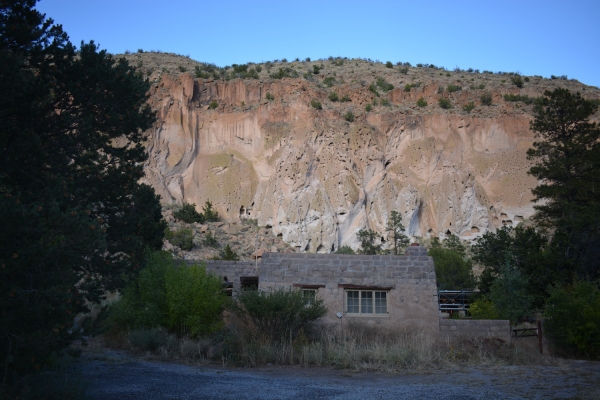
Housing at Bandelier Park, New Mexico
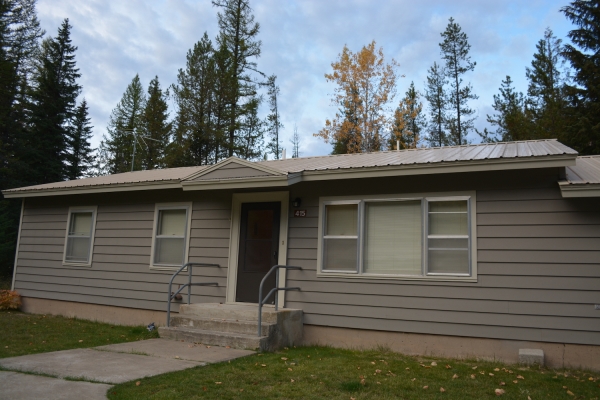
Housing at Glacier Park, Montana
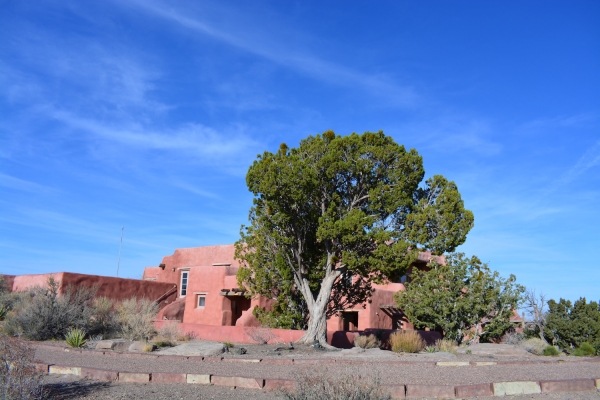
Housing at Petrified Forest, Arizona
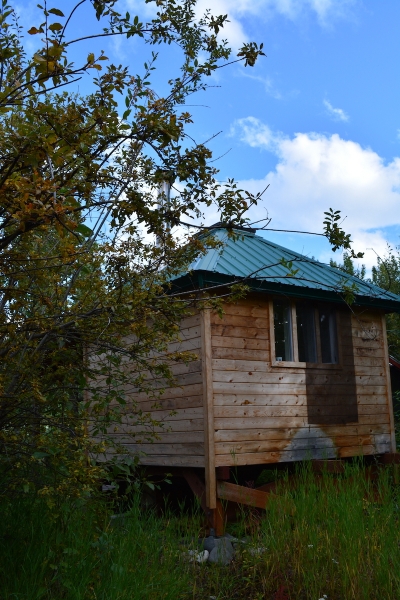
Wrangell-St. Elias Housing- Alaska
KP: I'm sure it varies, but do you camp when you're doing the residencies or stay in lodges or motels?
JH: No camping for me! The Artist in Residency programs provide housing – often National Park staff housing off season when there aren’t as many folks working there (they are called seasonals).
KP: It sounds like your whole family is very musical! Your husband, David Cullen, plays guitar and bass, your son, Graham, is a cellist, and your daughter, Dana, plays horn. Is The Waters of Glacier the only album all four of you have played on together?
JH: Mesa Verde Soundscapes includes all 5 of us, including our daughter Risa on viola, as well as cellist, Graham, horn player, Dana, and David on guitar. Dana and Graham also share their sounds on Zion and Bryce Canyon Soundscapes. David is on all of them!
KP: Oops! I forgot that you have two daughters! Sorry, Risa!
Are your "kids" becoming professional musicians, too?
JH: Graham is Principal Cellist in the Evansville Philharmonic Orchestra (in Indiana) and Owensboro Symphony (Kentucky). After serving as a long-term sub in Dallas Symphony (up to the pandemic) on horn, Dana decided to pursue a new career in medical coding. Risa is a high school orchestra teacher in a suburb of Philadelphia.
KP: Let's find out some more about your background! Where were you born and where did you grow up?
JH: Born and raised in suburbs of Buffalo, NY.
KP: Which came first for you - the piano or the oboe?
JH: Piano 1st then oboe later.
KP: When did you start music lessons and how long did you take them?
JH: Started piano at 7, and oboe at around 12 and continued to study through college (Temple University graduate in Music).
KP: You are better-known for oboe and English horn, but do you prefer those over the piano?
JH: No. I enjoy the challenges and satisfaction I get from both of these instruments. The piano brings so much joy as a solo instrument while the oboe and English horn are so much fun to play in an ensemble.
KP: I keep meaning to ask: What is the difference between the oboe and English horn?
JH: The English horn is a 5th lower (key of F) than the oboe which is in the key of C. He has a deeper, darker sound.
KP: Ah, thanks!
I'm always curious about this - did your music teachers encourage you to compose and/or improvise? (Mine more or less forbade it!)
JH: No encouragement to compose or improvise. I developed an interest in that when I was finishing up college.
KP: When did you start composing?
JH: I began making up oboe parts to accompany folk singer, Kevin Roth, in my early 20’s, and then began composing pieces for ONE ALTERNATIVE, a trio of 2 guitars and oboe, also at the same time.
KP: When did you release your first record?
JH: ONE ALTERNATIVE released Greenlawn in 1986. The three members all wrote music for this. My first solo album was Glacier Soundscapes in 2010.
KP: I think that's the only one I haven't reviewed. About how many albums have you recorded on?
JH: How many albums?? Good question… I have no idea. I try to save the CDs of all the folks I have been invited to share oboe and English horn lines on – I think there are at least 40, plus about eight ONE ALTERNATIVE albums and eight of my own; also two appearances on Will Ackerman releases and one Windham Hill Compilation.
KP: Impressive! Did you grow up in a musical family?
JH: My family appreciated and enjoyed music, but were mostly listeners, not players, when I was growing up.
KP: How many instruments do you play?
JH: Piano, oboe, English horn – pretty well. Then a few others just well enough to teach kids…flute, sax, clarinet.
KP: So you teach music, too?
JH: Oh yes. I have been teaching private lessons on oboe, piano, sax, clarinet and flute for many years.
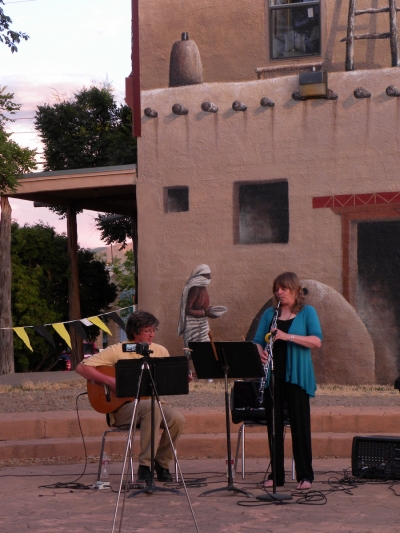
Concert with David Cullen near Mesa Verde.
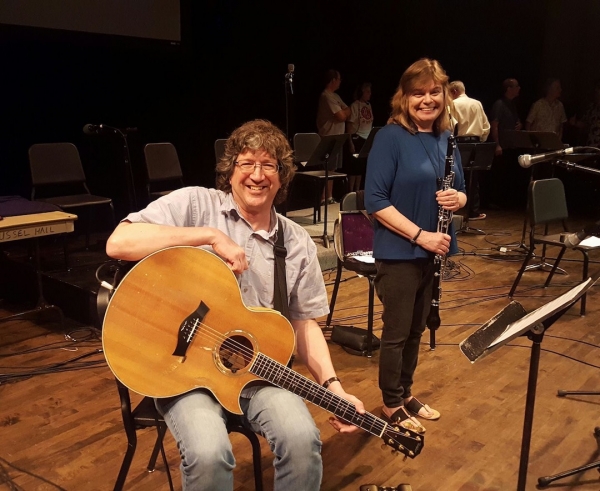
Jill and David Cullen at Zone Music Reporter awards concert.
KP: You also do workshops in schools around the country, right? What do you do in those?
JH: I’ve only done a few …usually when I am an artist in residence. I demonstrate how I create the music that is inspired by nature by showing, for example, rippling chords on the piano for waves in water, or imitating a bird call on the oboe. I bring in a photo of what I am inspired by for the music - such as a Western Meadowlark bird in the Badlands. The kids know what the bird sounds like, so they can understand how I am imitating the actual sound in a musical sense. I then show them how I harmonize the melody and create a simple song form.
KP: What and who have been some of your strongest musical influences?
JH: Paul McCandless of the group Oregon is my main influence. Paul Winter also was a significant influence. Ralph Towner, Phil Aaberg and Keith Jarrett on piano.
KP: I met Paul McCandless a couple of times when he was performing with Spencer Brewer. He's amazing! So is Phil Aaberg. I met him several times when we were both living in the Bay Area. Great guy and a great pianist!
What have been your most exciting musical experiences so far?
JH: Touring the Czech Republic and Germany with a Jazz Opera Company in the early 1990’s. Playing with Will, Mike Manring, Paul McCandless, Phil Aaberg on Windham Hill Concerts throughout the 1990’s and 2000’s. Some orchestral experiences with groups I am a member of locally, and Carnegie Hall with Lynn Yew Evers, Eugene Friesen, Will and David are just a few!
KP: Who are some of your favorite composers?
JH: Ralph Towner, Phil Aaberg, JS Bach, Samuel Barber, and Stravinsky.
KP: A very eclectic group!
If you could have any three wishes, what would they be?
JH: That my family stays healthy.
More invitations to National Parks as an Artist in Residence.
To visit a few more foreign countries: New Zealand, Switzerland, return to England and Ireland.
KP: What's up next for you?
JH: This past year saw the premiere performance of an orchestral arrangement with solo oboe/English horn of four of my National Park pieces. I just received a grant for a new orchestration of four other National Park pieces and we have a tentative performance date set in June 2022.
I also hope to record and release all the new music I have written over the last couple of years, and continue to share live concerts of this music.
KP: Is there anything else you'd like to "talk" about?
KP: It's been a pleasure, Jill! Best wishes to you in all of your projects and I hope we can meet up next time you're in the PNW!
Many thanks to Jill Haley for taking the time to chat! For more information about Jill and her music, be sure to visit
her website and her
Artist Page here on MainlyPiano.com.
Kathy Parsons
September 2021








